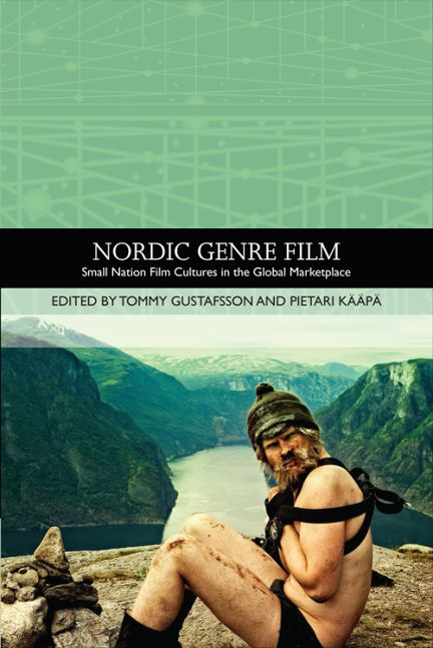Book contents
- Frontmatter
- Contents
- List of Illustrations
- List of Contributors
- Traditions in World Cinema
- Introduction: Nordic Genre Film and Institutional History
- PART I HERITAGE CINEMA AND NATIONAL NARRATIVES
- PART II CRIME AND DETECTIVE NARRATIVES
- PART III NORDIC OPTIMISM: ROAD MOVIES, COMEDIES AND MUSICALS
- 9 Fathers and Sons Reunited: Road Movies as Stories of Generational Continuity
- 10 The Nordic ‘Quirky Feel-Good’
- 11 Contesting Marriage: The Finnish Unromantic Comedy
- 12 Powered by Music: Contemporary Film Musicals, Nordic Style
- PART IV NORDIC HORRORS
- PART V GENRE BENDERS
- Index
9 - Fathers and Sons Reunited: Road Movies as Stories of Generational Continuity
from PART III - NORDIC OPTIMISM: ROAD MOVIES, COMEDIES AND MUSICALS
Published online by Cambridge University Press: 25 October 2017
- Frontmatter
- Contents
- List of Illustrations
- List of Contributors
- Traditions in World Cinema
- Introduction: Nordic Genre Film and Institutional History
- PART I HERITAGE CINEMA AND NATIONAL NARRATIVES
- PART II CRIME AND DETECTIVE NARRATIVES
- PART III NORDIC OPTIMISM: ROAD MOVIES, COMEDIES AND MUSICALS
- 9 Fathers and Sons Reunited: Road Movies as Stories of Generational Continuity
- 10 The Nordic ‘Quirky Feel-Good’
- 11 Contesting Marriage: The Finnish Unromantic Comedy
- 12 Powered by Music: Contemporary Film Musicals, Nordic Style
- PART IV NORDIC HORRORS
- PART V GENRE BENDERS
- Index
Summary
Road movies are usually defined as stories of resistance and freedom. The road is seen as a space of possibility which, when moving away from certain place, gives the wanderer a sense of freedom and the opportunity to criticise what is left behind. As such, road movies can be understood as progressive, for they give rise to the possibility of reinterpreting societal conventions and boundaries. In Western societies, which cherish the notion of rationality and productivity, freedom reached on the road through aimless wandering means opposition. It is often coded as youthful rebellion, but the road genre has never been only confined to young people (e.g. Mills 2006: 20).
This chapter asks what happens to the conventions of the road movie, and in particular its ethos of resistance, when younger and older generations hit the road together in Nordic films of the 2000s. In raising this question I discuss the use of road movie conventions in two Finnish road movies, the fictional Road North (Mika Kaurismaki, 2012) and the documentary Finnish Blood Swedish Heart (Mika Ronkainen, 2012), which both feature stories of father–son pairings driving together towards a new kind of understanding of their roots. The films offer two ways to see how road movies, in essence, work between the national and the transnational. Road North depicts a road journey inside the borders of Finland. Finnish Blood Swedish Heart, in comparison, is profoundly transnational anyway in its subject matter of a father and son duo driving from Finland to their past in Sweden, but film was also financed as a Finnish–Swedish co-production and, before being awarded as the best Finnish documentary of the year, it received the Dragon award for the best Nordic documentary at the Gothenburg International Film Festival 2013.
It is often said that cinema cannot be understood as nationally isolated, for the boundaries between nations are crossed in several dimensions from financing and production to distribution and exhibition (e.g. Elkington and Nestingen 2005: 1–16). This is eminently true when talking about road movies. The road movie is the epitome of transnational cinema because of its circulating conventions and universal theme of struggle between individual and community.
- Type
- Chapter
- Information
- Nordic Genre FilmSmall Nation Film Cultures in the Global Marketplace, pp. 133 - 146Publisher: Edinburgh University PressPrint publication year: 2015



